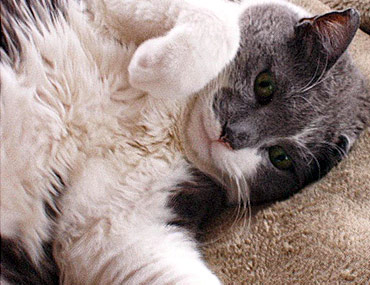Overview
Coccidiosis is a disease caused by the tiny, single-cell pests, coccidia. These parasites can live in the wall of your cat’s intestines. They are more common in kittens, but can still infect older cats and dogs, as well. Our feline friends can become infected by sharing a litter pan or ingesting things in an environment that is contaminated with coccidia-infected feces.
To learn more about coccidia visit http://www.petsandparasites.org/cat-owners/coccidia.html.
Symptoms
If your cat is infected with coccidia, the symptoms can vary. In adult cats, there may be no signs of infection, while in kittens the symptoms can be more serious. The most common symptom is diarrhea; in severe situations, the diarrhea can be accompanied by blood in the stool.
 Diagnosis/Treatment
Diagnosis/Treatment
The good news is that coccidiosis is a very treatable condition. The coccidia parasites are often identified microscopically in your cat’s feces. Because these little pests are not visible to the naked eye, your veterinarian may recommend treatment for coccidiosis even if the parasite is not found in your cat’s stool. Additionally, if your kitty is plagued with diarrhea as a side-effect of the coccidiosis infection, your veterinarian may recommend supportive care to get the diarrhea under control.
Treatment for coccidia often includes oral antibiotics called sulfonamides, which control the parasites causing harm in your cat’s digestive tract. Following all recommendations from your veterinarian regarding the administration of medications is very important to effectively treat your pet for coccidiosis.
Prevention
You can help prevent a coccidia infection by keeping your yard clean of feces and reducing your pet’s exposure to possibly infected feces. Keeping your cat’s litter box clean is important, especially if you have multiple cats. If you adopt a new kitty, have a fecal sample examined immediately to rule out a parasitic infection, and keep infected pets away from those who are not!
If you have any questions or concerns, you should always visit or call your veterinarian – they are your best resource to ensure the health and well-being of your pets.
